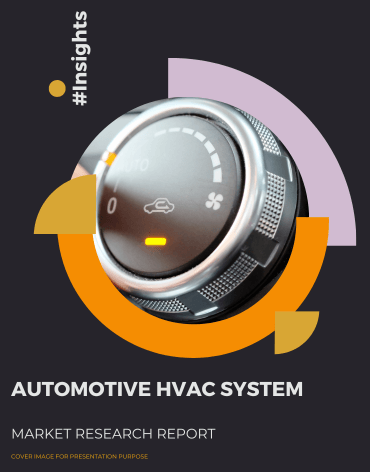Automotive HVAC System Industry Shows Steady Growth, Eyes $15 Billion Mark

The Automotive Heating, Ventilation, and Air Conditioning (HVAC) industry has witnessed remarkable advancements in recent years, transforming the driving experience and setting new standards for comfort, efficiency, and sustainability. This article explores the key trends, challenges, and innovations driving the automotive HVAC sector.
Consumers prioritize comfort and environmental consciousness, so the automotive HVAC industry has responded with cutting-edge technologies. Advanced climate control systems now offer personalized temperature settings, air quality monitoring, and energy-efficient solutions, aligning with the global push toward sustainable practices.
The rise of smart vehicles has ushered in a new era for automotive HVAC systems. Integration with Internet of Things (IoT) devices allows remote climate control via mobile apps, predictive maintenance, and adaptive temperature settings based on individual preferences. This not only enhances user experience but also contributes to energy efficiency. The shift towards electric and hybrid vehicles has presented unique challenges and opportunities for the HVAC industry. Innovations in battery thermal management systems are crucial for maintaining optimal operating conditions. Efficient HVAC systems play a pivotal role in extending the range of electric vehicles and ensuring passenger comfort.
With the increasing complexity of vehicle designs and the incorporation of advanced materials, thermal management becomes a critical aspect. Balancing the need for efficient heating and cooling while minimizing energy consumption remains challenging. Engineers are exploring novel heat exchange materials and innovative designs to address these concerns. Environmental regulations and the push for sustainable practices have led to a shift away from traditional refrigerants. The automotive HVAC industry is actively exploring eco-friendly alternatives with lower Global Warming Potential (GWP). This transition not only aligns with regulatory requirements but also reflects a commitment to environmental responsibility.
1 . Embracing Artificial Intelligence (AI) for HVAC Optimization:
Artificial Intelligence is playing a crucial role in optimizing HVAC performance. Machine learning algorithms analyze driving patterns, weather forecasts, and user preferences to predict and adjust climate control settings. This not only enhances user comfort but also contributes to energy efficiency by tailoring HVAC operations to real-time conditions.
The future of automotive HVAC promises even more exciting developments. Researchers are exploring innovative solutions such as thermoelectric HVAC systems, which convert waste heat into electricity, and advanced sensors for real-time air quality monitoring. These technologies aim to further enhance the driving experience and reduce the environmental impact of vehicle HVAC systems.
2 . Global Automotive HVAC Market Forecast:
3 . Standalone HVAC
Overview: Standalone HVAC systems operate independently of a vehicle's main engine. They are designed to provide climate control functionality even when the engine is off, ensuring comfort and convenience for passengers in various scenarios, such as during brief stops or when the vehicle is parked.
Key Features:
- Battery-Powered Operation: Standalone HVAC systems often rely on the vehicle's battery or a separate power source, allowing them to function without the need for the engine to be running.
- Pre-Cooling and Pre-Heating: These systems can be pre-programmed to cool or heat the interior of the vehicle before occupants enter, enhancing comfort upon entry.
Advantages:
- Enhanced Comfort and Convenience: Standalone HVAC systems provide a superior level of comfort by maintaining a desirable temperature inside the vehicle regardless of external conditions.
- Reduced Engine Idling: By reducing the reliance on the main engine for climate control, standalone HVAC systems contribute to fuel savings and lower emissions.
Challenges:
- Limited Runtime: The standalone systems' operation is constrained by the available power source, leading to limitations on the duration of climate control functionality.
- Battery Drain Concerns: Prolonged use of standalone HVAC systems may impact the vehicle's battery life, potentially causing challenges if not managed efficiently.
4 . Dependent HVAC
Overview: Dependent HVAC systems are integrated into the vehicle's main engine and rely on the engine's power to operate. These systems are synchronized with the vehicle's overall energy management and contribute to the thermal balance of the engine and passenger compartments.
Key Features:
- Integrated with Engine Operation: Dependent HVAC systems work in tandem with the vehicle's engine, utilizing excess heat or cooling generated during the engine operation.
- Energy-Efficient Operation: By leveraging the vehicle's existing energy sources, dependent HVAC systems aim for optimal efficiency in climate control.
Advantages:
- Energy Synergy: Dependent HVAC systems harness the thermal energy generated by the engine, promoting energy efficiency and reducing the overall environmental impact.
- Extended Operation: As long as the vehicle is running, dependent HVAC systems can operate without concerns about limited runtime.
Challenges:
- Dependency on Engine Operation: These systems are inactive when the engine is off, potentially leading to challenges in scenarios where passengers desire climate control without running the engine.
- Less Flexibility: Dependent HVAC systems may have limitations in providing pre-cooling or pre-heating when the vehicle is stationary.
5 . Leading Companies
Denso Corporation:
- Overview: Denso Corporation is a global automotive components manufacturer headquartered in Japan. Denso is a leading supplier of advanced thermal systems, including HVAC systems, for various vehicles.
- Key Strengths: Denso is known for its innovation in automotive technology, providing high-quality HVAC components that contribute to passenger comfort and overall vehicle efficiency.
Valeo:
- Overview: Valeo is a multinational automotive supplier based in France, specializing in the design and manufacturing of automotive components. Valeo has a significant presence in the HVAC segment.
- Key Strengths: Valeo is recognized for its expertise in thermal systems, including advanced climate control solutions that focus on energy efficiency and environmental sustainability.
Mahle:
- Overview: Mahle GmbH, based in Germany, is a prominent global automotive supplier. Mahle manufactures a wide range of components, including HVAC systems, for the automotive industry.
- Key Strengths: Mahle is known for its commitment to innovation, and its HVAC solutions are designed to meet the evolving needs of the automotive market, emphasizing efficiency and performance.
Hanon Systems:
- Overview: Hanon Systems, headquartered in South Korea, is a major player in the automotive thermal management industry. The company specializes in HVAC systems and other thermal solutions.
- Key Strengths: Hanon Systems is recognized for its technological advancements in thermal management, delivering HVAC solutions that enhance vehicle comfort and performance.
SANDEN:
- Overview: SANDEN Corporation, based in Japan, is a global manufacturer of automotive components, including air conditioning systems and compressors. SANDEN is a key player in the HVAC segment.
- Key Strengths: SANDEN is known for its expertise in air conditioning technology, producing reliable and efficient HVAC components that contribute to the overall performance of vehicles.
AoteCar:
- Overview: AoteCar is a Chinese company specializing in the production of automotive air conditioning compressors and related components.
- Key Strengths: AoteCar has gained recognition for its focus on manufacturing high-quality air conditioning compressors, serving both domestic and international markets.






